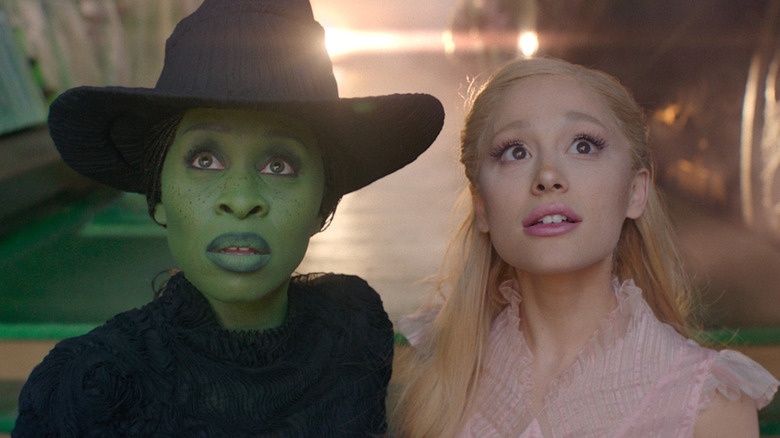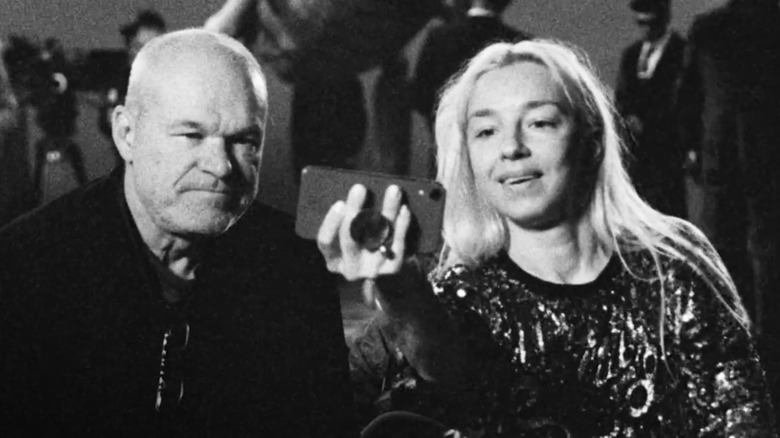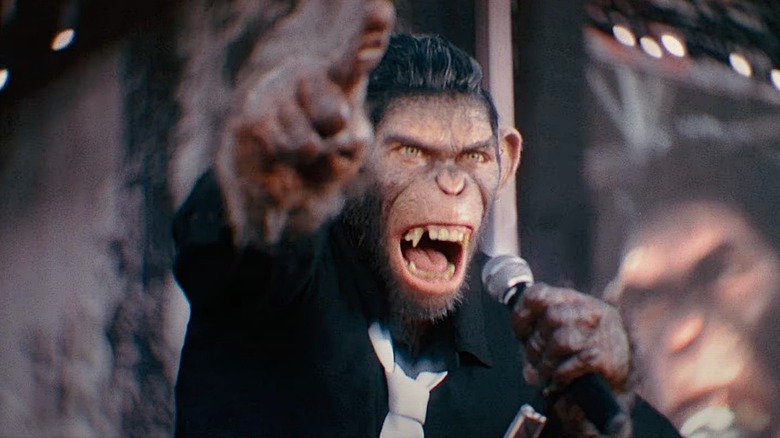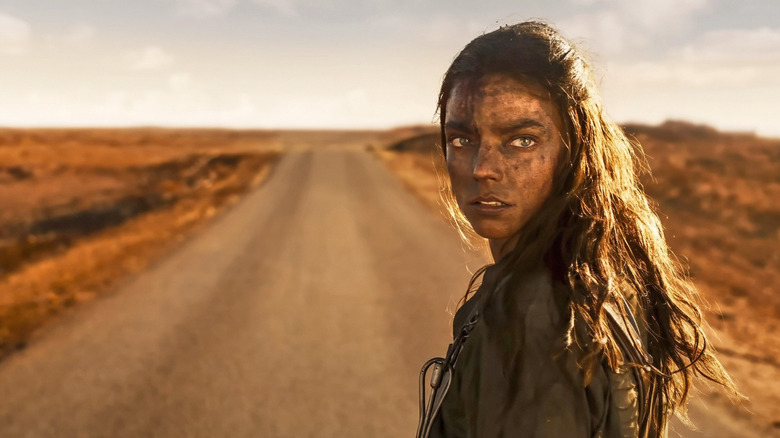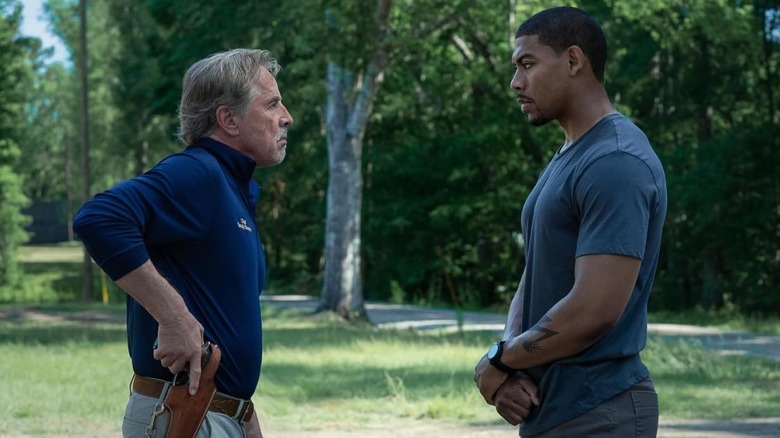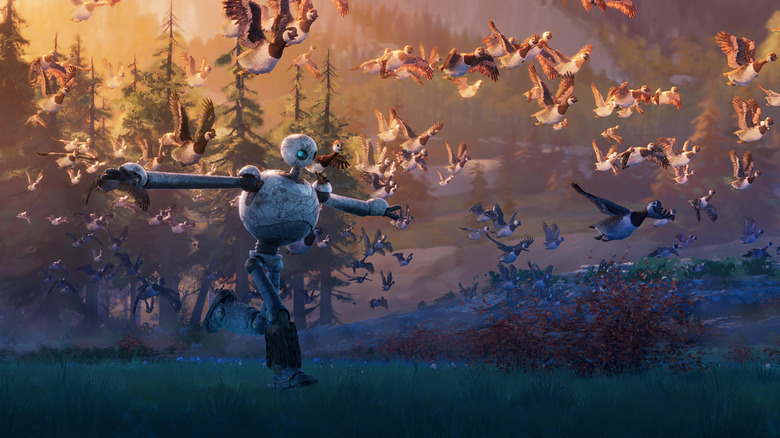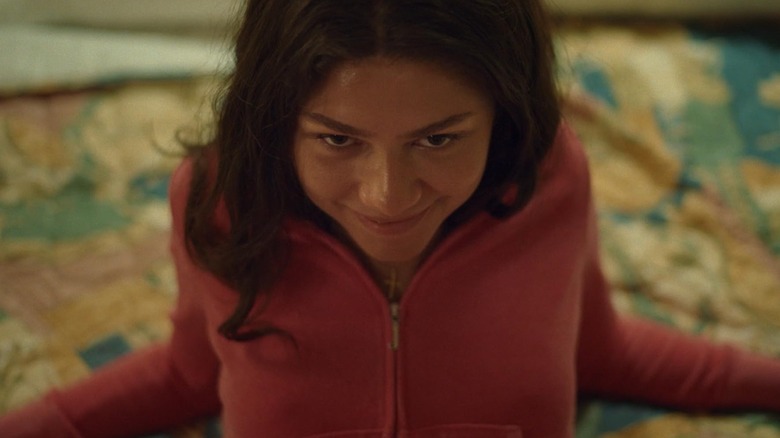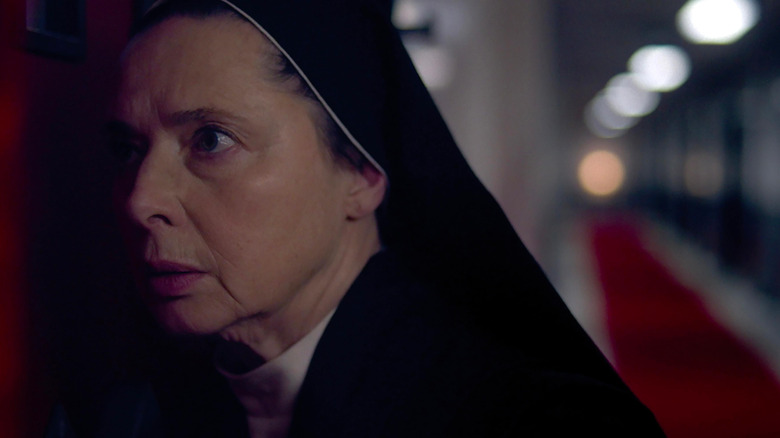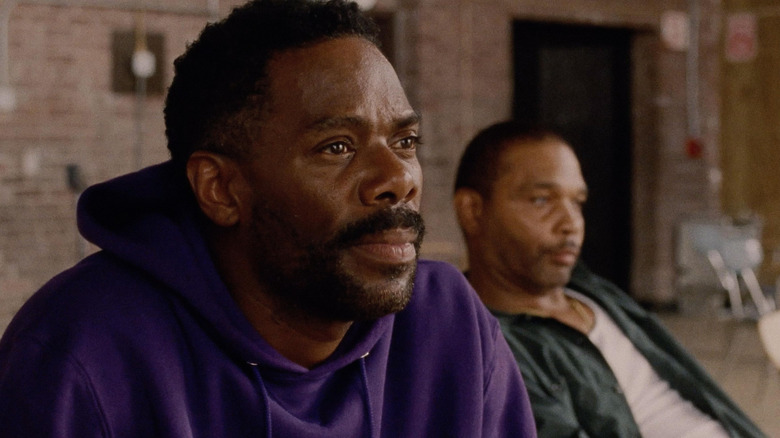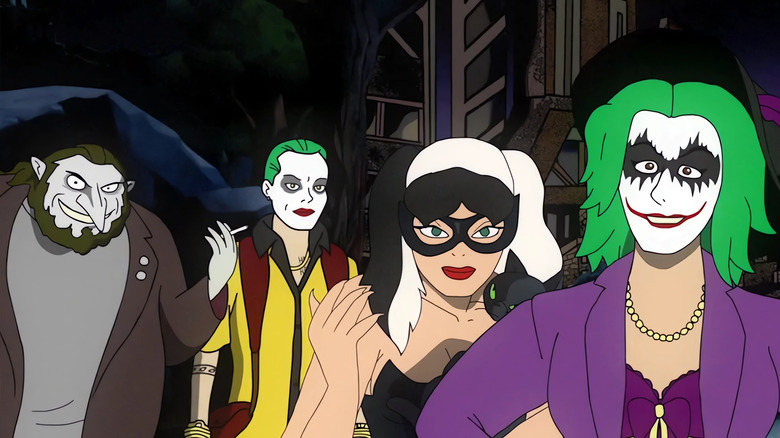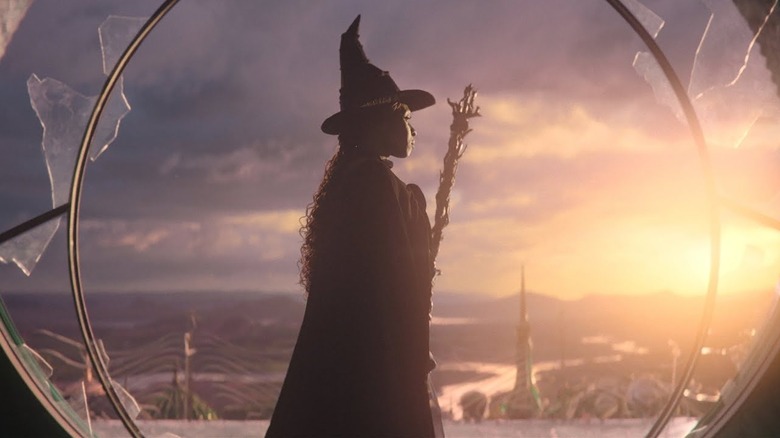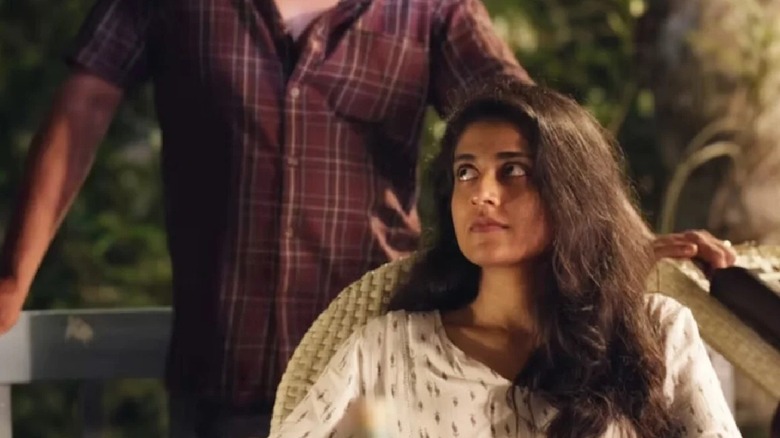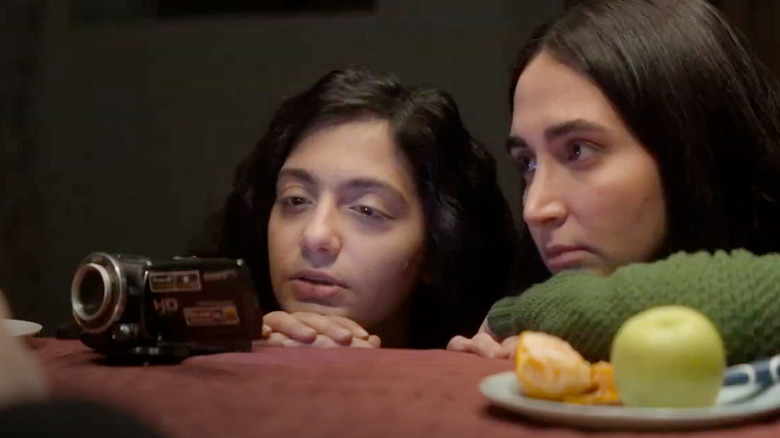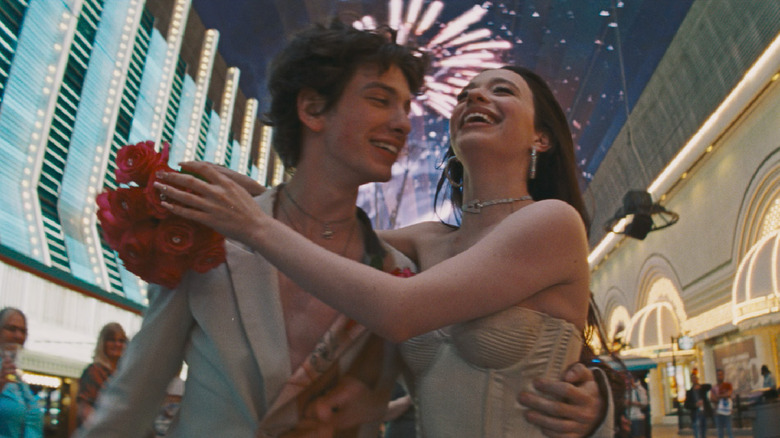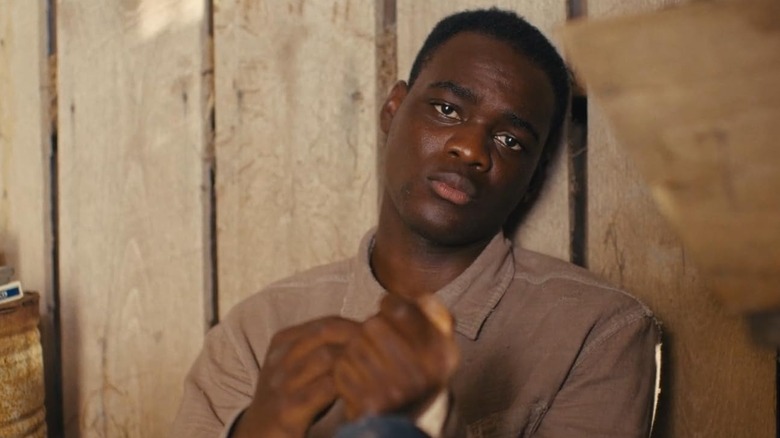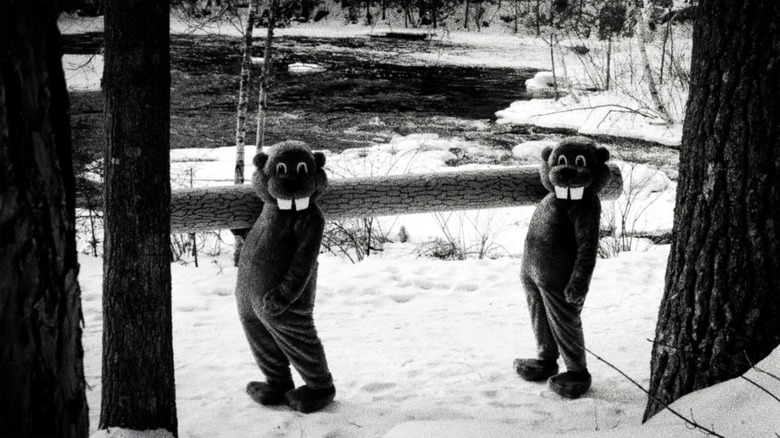The 15 Best Movie Scenes Of 2024
Chances are, if you like a movie, you won't emerge from the theater ready to tell your friends every single detail about the film. Your enthusiasm will manifest in more compact ways, like regaling folks about a specific scene from the motion picture you just adored. These sequences, acting as a microcosm of a special movie's overall quality, can spread like wildfire across not only your social circles but even the internet itself. Cinema in 2024 had lots of bumps in the road, as the biggest box office bombs of 2024 can attest. However, there were also plenty of standout movies featuring instantly buzzworthy scenes people couldn't stop talking about. The best movies of this year from all over the globe had a wide array of sequences that stuck around in people's minds for a multitude of reasons.
Some of these scenes rose to become the cream of the crop because of their emotional immediacy. Others were simply hysterical or enthralling to watch unfold, especially when viewed in communal settings. Still other scenes spoke to larger sociopolitical discussions that many of the most controversial movies of 2024 weren't afraid to wade into. Whatever made these scenes so extraordinary, it's clear their relevance to moviegoers of all stripes won't end the moment 2025 begins. We'll all be talking about the 15 best movie scenes of 2024 for years to come, especially when one is trying to communicate to another person why certain 2024 releases are simply must-see films.
There's a run-in with Uwe Boll in Don't Expect Much from the End of the World
Who knew Uwe Boll, the infamous filmmaker whose entire filmography is rotten, would end up appearing in one of 2024's most acclaimed movies, "Do Not Expect Too Much from the End of the World." Director Radu Jade's bleak comedy examining the modern capitalistic world contains a sequence in which protagonist Angela (Ilinca Manolache), who has gone somewhat viral shooting TikTok videos where she portrays herself as an aggressively randy man, makes a delivery for work to a movie set run by Boll. Shooting some ludicrous sci-fi motion picture involving a gigantic bug, Boll takes time to talk to Angela and even appear in one of her videos. The whole sequence is quite surreal, especially since Jade invests a fascinating level of ambiguity in this project's feelings about Boll.
Is he a microcosm of societal rot? Is his presence supposed to reflect that the modern world has gone so wild that a fireball personality like Boll is somehow "normal"? So many fascinating layers lie beneath the surface of an already entertaining scene thanks to Boll being such a good sport and compelling presence. Plus it's fitting that a man who's been open in the past about exploiting German tax laws before 2006 to get movies financed would encounter a woman who exploits a corrupt company to pay rent. We all do what we have to in late capitalism, even Uwe Boll.
The Rock DJ number takes to the streets in Better Man
Michael Gracey's filmmaking on his first musical movie, "The Greatest Showman," left something to be desired. There was energy in the film's images, but the awkward cutting between famous faces like Hugh Jackman and stunt dancers kept undercutting the intended emotions of the tunes. Editing during the musical set pieces was that film's greatest weakness, which Gracy seems to have addressed it in his newest feature.
"Better Man," a maximalist musical biopic about Robbie Williams (here rendered as a CG monkey), features a lengthy musical number where Williams and the other members of boy band Take That sing the tune "Rock DJ." They croon these lyrics throughout the London cityscape, doing everything from gyrating on top of elderly women to bouncing around a record store to dancing in the streets.
This special rendition of "Rock DJ" is incredibly bouncy, ramping up the energy and theatricality of the original tune to make something that works well as an anthem bellowed by a chorus of singers. Better yet, it's captured on-screen as an unbroken single take. The camera never blinks as it follows Williams doing everything from racing past a magazine stand to falling off a double-decker bus in a Christ-like pose. It's a remarkable visual achievement in terms of editing and camerawork that really lets you appreciate the joyousness of music bringing people together. Michael Gracey, the editing sins of "The Greatest Showman" are forgiven.
Furiosa confronts Dementus one last time in Furiosa: A Mad Max Saga
When every George Miller movie is ranked, it becomes clearer than ever that this filmmaker never gives you the expected. Who could have imagined "Babe: Pig in the City" when they were watching the original "Babe"? For that matter, could people have even comprehended the wild imagery of "Mad Max: Fury Road" back in the '80s when the original "Max Mad" sequels launched? Inevitably, "Furiosa: A Mad Max Saga" once again subverts audience expectations. Rather than fully retread "Fury Road," "Furiosa" is a grander epic about day-to-day existence under oppressive fascism. These unexpected storytelling inclinations culminate not in a bullet-heavy showdown between good and evil, but rather in protagonist Furiosa (Anya Taylor-Joy) and Dr. Dementus (Chris Hemsworth) having a lengthy chat in the desert.
After years of hunting for revenge, Furiosa finally has Dr. Dementus in her clutches ... yet she gradually realizes she and this horrific man have more in common than she realized. Both are driven by violence and vengeance, while Dementus taunts her with the fact that she'll never receive the catharsis she wants from him. Trying to wring the same pain out of Dementus that he put Furiosa through is a meaningless endeavor. Their extended talk is bold for a summer blockbuster, but pays off in dividends. Not only does it crystallize the unique creative instincts of "Furiosa," but it also lends extra layers of meaning to why Furiosa defines her life by helping other women in "Fury Road."
Terry Richmond's identity becomes clear in Rebel Ridge
Ironically, the best "Road House" pastiche of 2024 was not the official "Road House" remake Jake Gyllenhaal suffered a gruesome injury over. Instead, it was Jeremy Saulnier's "Rebel Ridge." The film's protagonist, Terry Richmond (Aaron Pierre), is smartly modeled after Patrick Swayze's original "Road House" lead, entering "Rebel Ridge" as a mysterious figure with lots of previous adventures under his belt. Whereas the new "Road House" laid out a famous backstory for its protaganist, "Rebel Ridge" knows the power of keeping things a bit vague.
The potential of that restraint is realized in an unforgettable scene where police chief Sandy Burnne (Don Johnson) strolls out to take care of Richmond, who is standing just outside the police station. Simultaneously, Burnne's lackeys are looking up info on Richmond online. Initially believing Richmond is a nobody, Burnne proceeds to act all smug to Richmond, who simply wants to help his cousin stay out of jail. Director and editor Saulnier keeps cutting back and forth between this Richmond-Burnee interaction and other police officers uncovering the former character's past.
Just as Burnne and Richmond's tension reaches its highest point, the audience and other police officers discover Richmond is no ordinary man ... he's a close-quarters combat master. That's when Richmond begins taking names in exhilarating fashion. It's just the kind of propulsive action sequence you want from the "Green Room" director, not to mention a masterful demonstration of how keeping an aura of mystery around your protagonist can pay off.
Learning to fly was never so poignant as in The Wild Robot
The Marren Morris song "Kiss the Sky" gets highlighted in one of the most poignant segments in "The Wild Robot," a montage showing robot Roz (Lupita Nyong'o) helping adopted goose son Brightbill (Kit Connor) learn how to fly. It's a deeply moving sequence, as the once aloof, emotionally distant robot demonstrates tremendous tenacity in aiding Brightbill's growth as a flier. The film's sumptuous visual scheme also proves beneficial, as the striking, painterly backdrops accentuate the different seasons and days that pass as Roz helps Brightbill in this quest. The passage of time is lovingly rendered and, by proxy, helps make the lengthy dedication Roz has to this fowl even more emotionally tangible.
This stirring montage scene also nicely reflects how "The Wild Robot" takes familiar cinematic elements while making them feel brand new. We've all seen these kinds of montage sequences. Ditto animated family movies about robots learning to love. Yet the specific naturalistic backdrop, animation scheme, and lead characters in "The Wild Robot" make these qualities feel fresh once more.
When watching this scene, the larger cinematic trends that it's part of vanishes from one's mind. Instead, the focus remains on Brightbill's increasing deftness with the art of flying. It doesn't hurt, too, that "Kiss the Sky" is also a tremendously affecting tune that nicely fits this sequence's atmosphere. It's not the only "The Wild Robot" scene that tugs at the heartstrings, but this montage especially soars, demonstrating the movie's emotional prowess.
Tashi gives a monologue for the ages in Challengers
In the world of "Challengers," Tashi Duncan (Zendaya) is known for being an all-time great tennis player whose career got tragically cut short. Moviegoers walking out of "Challengers," though, undoubtedly found Tashi most notable for constantly exuding such a commanding and powerful aura on-screen. In all this love triangle chaos, Tashi constantly radiates a tangible sense of control. This is memorably exemplified in a great alleyway sequence where Patrick (Josh O'Connor) tries to talk Tashi into abandoning husband Art (Mike Faist) to coach him.
This inspires an unforgettably-written monologue (courtesy of screenwriter Justin Kuritzkes) from Tashi that Zendaya absolutely crushes. In a few minutes of screentime, she eviscerates the cocky Patrick with lines like "it's not cute for you to pretend you need to grind it out at these ... tournaments" and "you don't have a dream, Patrick."
Patrick walks around in "Challengers" like he's God's gift to man, even when he's sleeping out of his car or clearly coming off as desperate in social situations. Tashi pierces through that unearned confidence with this searing monologue and her final collection of short, curt phrases like "[winning] won't make you, it's too late for that." It's a mesmerizing flurry of dialogue delivered with Zendaya's glorious energy, as she spits out every line lathered in seething, pent-up frustration. Patrick's behavior isn't new, but Tashi's response is. Zendaya's astonishing performance here cements her as an acting legend on par with Tashi Duncan as a sports icon.
The truth comes out in Conclave
"Conclave" at first looked like it would be a "respectable" movie, without doing anything too dynamic to ruffle the feathers of older viewers. In execution, it turned out to be a riot of a motion picture, full of gifted performers delivering stellar turns while playing the pettiest men alive. All this drama comes to a head in one of the film's most riveting sequences, set in a cafeteria where all the cardinals assemble to eat in between voting on a new pope.
Here, Cardinal Thomas Lawrence (Ralph Fiennes) divulges the shady behavior, including bribery, of potential new papal candidate Cardinal Tremblay (John Lithgow). This influential figure, once cornered, at first tries to explain and justify his actions. However, crucial testimony from Sister Agnes (Isabella Rossellini) quickly seals his fate and proves these accusations aren't just stemming from a rival candidate for pope.
Director Edward Berger and the actors execute this sequence with delightful bombast. The staggering importance of all this backstabbing and betrayal to these people really comes through, along with a dedication to entertainingly pronounced flourishes. Agnes exits this sequence after doing an outsized curtsy, for instance, while Cardinal Goffredo Tedesco (Sergio Castellitto) responds to this mayhem not by delivering a speech, but by resorting to a prolonged hit on his vape pen. It's a fantastically human way to conclude a scene full of grandiose speeches and revelations.
Whitfield and Maclin rehearse lines in Sing Sing
Greg Kwedar's 2024 movie "Sing Sing" is an intimate exercise in lending humanity to the various prisoners of the Sing Sing correctional institution, specifically those participating in a theater program. Characters like John "Divine G" Whitfield (Colman Domingo) and a slew of real-life Sing Sing inmates playing versions of themselves (such as a mesmerizing Clarence Maclin) are the centerpiece of this feature, proving to be captivating figures to follow for an entire movie.
This is reflected in how even the most low-key activities become transfixing when they involve individuals like Whitfield, such as a montage sequence showing the various members of the theater troupe rehearsing lines for an original play called "Breakin' the Mummy's Code." Kwedar and cinematographer Pat Scola thoughtfully capture these human beings doing everything from playing basketball to folding laundry while trying to get their lines just right. This includes an especially moving display of Sean "Dino" Johnson trying to get on with his everyday business while also doggedly studying his lines and making sure he's got the correct inflections for his dialogue.
Through this "Sing Sing" montage, audiences get three-dimensional glimpses into who these men are beyond just their time in rehearsals. Simultaneously, their dedication to this art is also apparent while the film's emotionally tangible camerawork also gets a chance to shine. It's just one of many instances within "Sing Sing" where momentous pathos is wrung from characters many movies outright erase.
Attacking the Batman in The People's Joker
We're all accustomed to Batman movies culminating with the Caped Crusader duking it out with some nefarious foes to narrowly save Gotham City. But how many 21st-century features ask us to cheer as evildoers beat up the Dark Knight? That's just what the giddily subversive "The People's Joker" demands from moviegoers, Joker the Harlequin/Vera (Vera Drew) is stopped by Batman (Phil Braun) on her way to anchor a "UCB Live" broadcast, but his intervention is blocked by Joker's various anti-comedy pals, like The Penguin (Nathan Faustyn) and Poison Ivy (Ruin Carroll), showing up to save the day. A bunch of Gotham City oddballs previously oppressed (or even horrifically abused in the case of supporting character Mr. J) by Batman get sweet revenge on the superhero.
An already mischievous sequence becomes extra enthralling by how it's told. Director Vera Drew, in another one of the movie's many delightful visual eccentricities, renders this sequence in a hand-drawn animation style reminiscent of old cartoons like "Batman: The Animated Series." A visual style previously associated with reaffirming Batman's heroic status is here co-opted to depict his destruction at the hands of the marginalized and an especially hungry Venus flytrap. The captivating, rebellious attitude of "The People's Joker" manifests in many ways throughout its runtime. Successfully getting audiences to cheer on the demise of Batman, however, is one of its most devious sleights of hand.
Elphaba defies gravity in Wicked
The first part of "Wicked" on the big screen was always going to end with "Defying Gravity." It's not only the intermission break in the original stage play, but it's also just the perfect way to send audiences out of the theater — provided the film executes it properly. Thankfully, director Jon M. Chu and company brought "Defying Gravity" to the silver screen with just the panache and theatricality it deserved.
Stephen Schwartz's stirring lyrics are maintained without a single blemish, but what's really interesting here are the unique variations added to "Defying Gravity" in its movie incarnation. Lengthier pauses are incorporated throughout the song to allow Elphaba (Cynthia Erivo) and Glinda (Ariana Grande) more time to interact. Their dissipating friendship really hits home with these freshly concocted breaks.
Where "Defying Gravity" really soars in its new qualities, though, is a segment in which Elphaba falls to the ground in Emerald City after she first attempts to fly, as past negative comments from others race through her mind. Watching Elphaba soar back up to the sky and finish up "Defying Gravity" is a tremendous sight. Erivo's powerful vocals and a dazzlingly bombastic instrumental accompaniment cap off this showstopper musical number on a glorious note. Why did "Wicked" blow everyone away at the box office? Chalk it up heavily to this sweeping, unforgettable sequence.
Anjali expresses appreciation for Shajitha in Aattam
Director Anand Ekarshi's "Aattam" eventually focuses on a largely male theater troupe discussing how they handle their one female participant, Anjali (Zarin Shihab), getting assaulted by the most famous male member of the team at a party. Before that, however, there's the earliest hours of that fateful party, where Anjali talks to one of the few other women on the premises, Shajitha (Nandini Gopalakrishnan). Anjali says that Shajitha and her daughter should take her bed so that they can avoid sleeping on a bumpy couch. They exchange warm words to each other before Anjali wraps Shajitha in her arms and quietly says that she's so happy there's another lady here.
It's a beautifully moving scene, reflecting both the terrific performances from Shihab and Gopalakrishnan as well as Ekarshi's intuition as a filmmaker to pause and absorb smaller moments between characters. However, it especially resonates as quietly tragic in the larger context of "Aattam," as the rest of this movie focuses on men constantly finding ways to dismiss the perspectives and humanity of women for their own benefit.
Contrasting all that is an intimate portrayal of ladies looking out for one another. Anjali and Shajitha share a bond and concern for each other that eludes the male characters dominating "Aattam." Their memorably touching scene in "Aattam" demonstrates how human beings can ideally behave towards one another ... before unflinchingly depicting toxic gender norms that are inescapable in society.
Rezvan and Sana watch protests in The Seed of the Sacred Fig
Rezvan (Masha Rostami) and Sana (Setareh Maleki) are sisters in an unhospitable home. Their father, Iman (Missagh Zareh), is an investigating judge for Tehran's Revolutionary Court, while their mother Najmeh (Soheila Golestani) constantly tells her daughters to act "properly" so as not to jeopardize Iman's job. In their house, local protestors rebelling against an authoritarian government are called "monsters" and other dehumanizing terms. Iman often signs death sentence declarations for these protestors, so of course he regurgitates rhetoric he gets from his superiors and local TV stations.
"The Seed of the Sacred Fig," however, takes the time to depict Rezvan and Sana absorbing grueling reminders of reality, as in a sequence where the sisters bask in the light of a cell phone, watching actual real-life footage of Tehran protestors getting brutalized by the police. The pair must watch in secret, so as not to anger their parents and risk losing this technological connection to reality.
Tension seeps in every inch of the frame, while the actual footage depicting cruelty against protestors is unspeakably harrowing. Just the images of Rezvan and Sana leaning close to the phone in an otherwise darkened room are striking. They're scrambling toward the light in an oppressive household and taking care of each other in the process. This richly human scene just makes the nail-biting, suspenseful stretches of "Sacred Fig" even more absorbing.
Anora and Vanya spend their greatest day in Las Vegas
A Robin Schulz remix of the Take That song "Greatest Day" dominates the first scene of "Anora" in ironic fashion. The lyrics and jubilant melodies play in stark contrast to a deeply ordinary day at the strip club where protagonist Ani (Mikey Madison) works. Its sonic hopefulness for the future clashes with more complicated realities of the here-and-now. When "Greatest Day" reappears, however, it's in a more sweeping, emotionally enthralling sequence. While on an impromptu trip to Las Vegas, Ani's recent client/potential love Vanya (Mark Eydelshteyn) proposes to her. The two sprint off to the chapel, say their vows, then joyfully romp through Vegas, all while "Greatest Day" blares on the soundtrack.
This bliss will not last. Even in the moment, it's clear to audiences that this kind of spur-of-the-moment Vegas wedding can't be permanent. But as it transpires, it's impossible not to get swept up in Ani's joy, which is perfectly reflected in the "Greatest Day" needle drop. After spending a career concocting tangibly realistic movies, writer-director Sean Baker uses this captivating sequence to vividly reflect what it's like to feel submerged in love. It's noisy, it's overwhelming, it feels so grand that it can only be expressed through a song like "Greatest Day." Ani's joy becomes the audience's joy in this enchanting set piece, which feels extra impressive given the bittersweet scenario Ani later becomes trapped in. Joy never lasts, but boy can it be memorable.
Hattie gives Turner a hug in Nickel Boys
When someone brings up movies shot from a first-person perspective, it's usually the most disturbing horror movies told from the killer's POV that leap to mind. RaMell Ross's "Nickel Boys," however, is bound to become the new gold standard for this style of filmmaking. The perspectives of Elwood (Ethan Herisse) and Turner (Brandon Wilson) define where Ross and cinematographer Jomo Fray put the camera in "Nickel Boys," creating an incredibly immersive experience that's truly one of a kind. The power of these idiosyncratic visuals is showcased in a scene where Turner encounters Elwood's mother Hattie (Aunjanue Ellis-Taylor) while her son is in the hospital.
The aloof Turner has been very open to Elwood about how he doesn't have any need for loved ones and connections, navigating this unforgiving world on his terms. Hattie talks to Turner for a moment, inquiring about Elwood, before concluding their conversation by offering Turner a pair of hugs. The camera, positioned through Turner's eyes, receives this display of warm affection. We don't see Turner's face, but it's easy to imagine what a tremendous impact it has on him. A teenager forced to fend for himself so often experiences love, all while being stuck in a reform school, Nickel Academy, that dehumanizes its forced attendees. In Hattie's arms, Turner is reminded of the power of human connection, while audiences witness a striking hug like no other in cinema history.
A man brawls with beavers in Hundreds of Beavers
Cartoony carnage is the name of the game in "Hundreds of Beavers." Fish painfully nibble on people's fingers, beavers have their innards carved out, baby rabbits are roasted over a fire on-screen ... it's all gloriously silly violence in this homage to silent comedies and "Looney Tunes" cartoons. An instantly memorable display of this "grisliness" in director Mike Cheslik's masterpiece comes in the finale, when protagonist Jean Kayak (Ryland Brickson Cole Tews) narrowly evades getting torn to shreds by a group of sadistic beavers and their trusty buzzsaw.
Once he's removed from his bonds, Kayak initiates an extensive hand-to-hand tussle with the beavers (rendered, like all "Hundreds of Beavers" animals, as humans in animal costumes). The gags here come at the viewer in rapid fashion, including an inspired bit where a beaver tosses a knife in between its hands through some editing magic. The extreme bits of cartoony violence enacted upon the beavers, meanwhile, are hysterical. One beaver is tossed into a fireplace and just explodes, while another plops onto the buzzsaw and is subsequently dismembered, with packing peanuts (functioning as a substitute for blood) flying everywhere.
It's a gloriously demented display of action that keeps demonstrating inspired methods to dispose of beavers in over-the-top style. More serious action movies could use this hysterical set piece's imagination and excitement. This side-splitting beavers vs. man duel embodies the unforgettable comedic lunacy of "Hundreds of Beavers."
